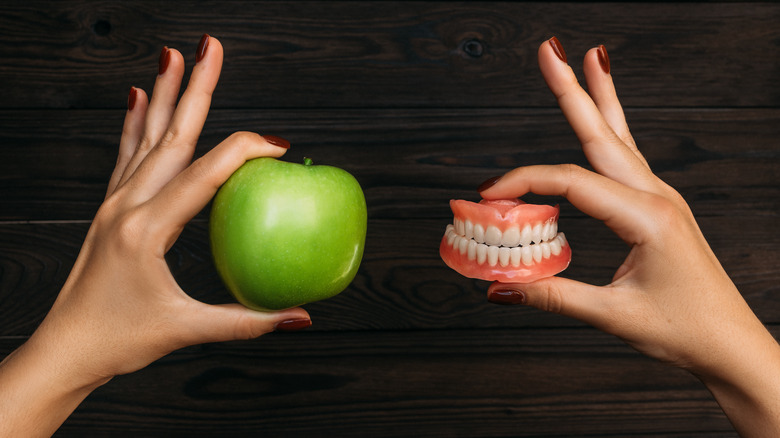Why You Need To Chew More
Chewing our food too hastily is more than just a choking hazard, according to Heathline. As it turns out, chewing is linked not only to our digestive health, but to our dental health, skin health, and the development of our facial structure (via mindbodygreen).
Not chewing our food thoroughly can throw off our digestive system. According to experts at Intestinal Labs, the physical act of chewing signals enzyme and acid production in the stomach in order for the body to break down food. If we don't spend enough time chewing our food, not enough of these acids and enzymes will be produced to adequately break down the food we've swallowed, and this can cause cramps, heartburn, diarrhea, headaches, and skin issues (via Healthline).
Interestingly, you're not the only one who might not be giving yourself enough time to chew properly. Science shows that humans collectively as a species are not adequately chewing, leading to progressive declines in the size of our jaws, skulls, and air passages (via mindbodygreen). Chewing gives our jaw the workout that it needs for healthy development, shape, and positioning explains board-certified pediatric dentist Staci Whitman via mindbodygreen. However, over the course of human evolution, we are now chewing far less than our early ancestors once did.
Diets requiring less chewing hinder jaw development
In a 2016 study, Harvard graduate student Katherine Zink looked at the relationship between chewing frequency and human jaw structure (via Atlas Obscura). Tracking numbers of participant chews through the use of facial electrodes, participants gnawed on different types of vegetables, along with either raw, pounded, or sliced and cooked goat meat. Based on the state of the food after subjects had spit it out, Zink determined that the pounded or sliced meat greatly reduced the number of participant chews. These findings support the growing body of research that the introduction of early human tools for cooking and cutting food reduced our time spent chewing, contributing to the decreased size of our jaws and teeth we have today.
Coupled with our everyday use of cutlery, humans are also now consuming more refined foods. Such food items like gummy snacks and tubes of yogurt further reduce our need for chewing. Dentist Staci Whitman explains how this influences our skeletal facial structure, writing via mindbodygreen, "In my work, I've learned that people who tend to eat more processed and refined foods have smaller and often underdeveloped jaws than those who eat traditional diets with foods that require more chewing."
Our jaws need ongoing, daily stimulation. By eating foods that force us to chew on a regular basis, we can promote optimal jaw development and breathing function.


